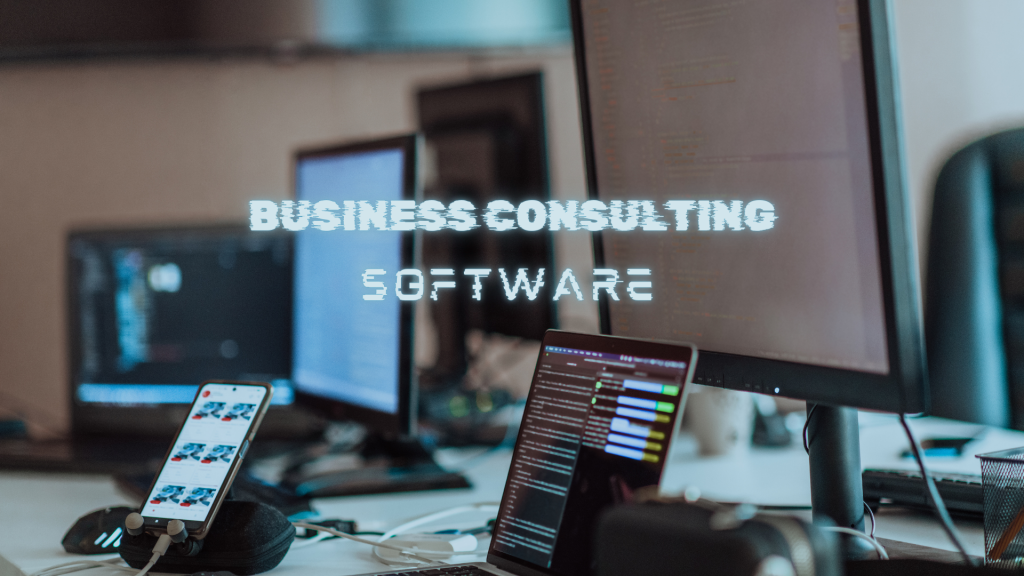Choosing the right AI business consulting software can significantly impact your company’s strategy, productivity, and bottom line. However, with so many options available in the market, it can be challenging to know where to begin. This guide will help you understand the landscape of AI business consulting software and provide the necessary insights to make the best choice for your needs.
What is AI Business Consulting Software?

AI business consulting software leverages artificial intelligence and machine learning algorithms to provide data-driven insights, strategic recommendations, and process automation to businesses. These platforms are designed to analyze amounts of data, detect patterns, predict trends, and offer actionable insights for decision-making. They are particularly useful for companies looking to optimize operations, drive innovation, and achieve sustainable growth.
The software is typically used by business consultants, analysts, and executives to improve efficiency, reduce costs, and enhance decision-making processes. It integrates AI capabilities like predictive analytics, natural language processing (NLP), and automation, streamlining business analysis and offering personalized recommendations based on real-time data.
Common Features of AI Business Consulting Software
Understanding what features the software offers is key to choosing the right solution. Here are some essential features to consider:
| Feature | Description |
|---|---|
| Predictive Analytics | Forecasts trends and scenarios using historical data. Helps businesses anticipate outcomes and adjust strategies accordingly. |
| Automation Tools | Automates repetitive tasks like data entry, reporting, or invoice management, improving operational efficiency. |
| Natural Language Processing (NLP) | Processes and understands unstructured data (emails, documents) to extract insights and offer recommendations. |
| Scenario Planning | Simulates multiple scenarios to understand potential outcomes before making a decision. |
| Integration Capabilities | Connects with other software systems (like CRMs and ERP platforms) for seamless data sharing. |
| Dashboards & Reports | Provides visualizations and reports on KPIs to guide strategic planning and decision-making. |
| Machine Learning Models | Continuously learns from interactions and improves recommendations over time. |
| Customization Options | Tailors workflows and reports to meet specific business requirements. |
Who Uses AI Business Consulting Software?
AI consulting software is used by a variety of professionals across industries. Here’s a breakdown of typical users and how they benefit:
- Consultants and Analysts:
Use AI tools to analyze client data, identify opportunities, and create actionable strategies more efficiently.
- Executives (CEOs, CFOs, COOs):
Rely on these tools for real-time insights into company performance, helping them make strategic decisions with confidence.
- Finance Departments:
Forecast budgets, manage cash flow, and analyze financial risks using predictive analytics and automation tools.
- Sales and Marketing Teams:
Use AI to optimize campaigns, personalize customer experiences, and predict future sales.
- Operations Managers:
Streamline business processes by automating workflows and identifying inefficiencies through AI-driven insights.
Benefits of AI Business Consulting Software
Here are the key advantages that organizations experience when adopting AI business consulting software:
Improved Decision-Making:
AI software offers real-time insights and forecasts, helping businesses make informed decisions quickly. This reduces the risk of human error and ensures that decisions are based on data, not intuition alone.
Enhanced Efficiency through Automation:
Automating routine tasks like data entry, report generation, or process monitoring allows employees to focus on higher-value work. This leads to improved productivity and cost savings.
Cost Savings:
With AI tools handling repetitive tasks and complex analysis, businesses can reduce labor costs and avoid costly mistakes. Additionally, optimized operations lead to higher profitability.
Scalable Solutions:
AI business software grows with your company, making it ideal for businesses that plan to expand. As your needs evolve, many solutions offer modular upgrades or add-ons.
Better Customer Experience:
AI software helps improve customer experience by analyzing feedback, predicting customer behavior, and personalizing interactions. This leads to higher satisfaction and loyalty.
Challenges to Consider
While AI business consulting software offers many benefits, there are challenges you should keep in mind:
High Initial Costs:
Some AI tools require significant upfront investment, especially if you need customization or integration with existing systems.
Integration Complexity:
Integrating AI software with other platforms (e.g., CRMs, ERPs) can be challenging and time-consuming.
Data Privacy Concerns:
Handling sensitive customer data comes with risks. It’s important to choose a solution that complies with data protection regulations like GDPR and CCPA.
Learning Curve for Employees:
Employees may need training to effectively use the software, especially if it involves advanced analytics or complex workflows.
Dependence on Data Quality:
AI software relies heavily on clean, organized data. Inaccurate or incomplete data can lead to poor recommendations.
Alternatives to AI Business Consulting Software
If full-scale AI software isn’t right for your organization, here are some alternatives:
| Alternative | Use Case |
|---|---|
| Traditional Consulting Firms | For businesses seeking human expertise and intuition for complex problems. |
| Business Intelligence (BI) Tools | Focus more on visualizing data and generating reports, without advanced AI-driven insights. |
| Robotic Process Automation (RPA) | Automates specific tasks without the cognitive abilities of AI. |
| Hybrid Solutions | Combine human consultants with AI tools for a more balanced approach. |
How Much Does AI Business Consulting Software Cost?
The cost of AI business consulting software varies depending on the platform, features, and level of customization. Here are common cost structures:
1. Subscription Plans:
Most providers offer monthly or yearly subscription models. These can range from $50 to $1,000+ per month, depending on usage and features.
2. Pay-Per-Use Pricing:
Some platforms charge based on the volume of data processed or the number of reports generated, making this a flexible option for smaller companies.
3. Customization and Integration Costs:
Custom workflows or integrations with existing tools may require additional fees.
4. Training and Onboarding Fees:
Vendors often charge for onboarding services to help employees get up to speed with the software.
How to Buy the Best AI Business Consulting Software
Here’s a step-by-step process to help you make an informed decision:
Step 1: Define Your Business Objectives
Before diving into software options, it’s crucial to identify the specific problems you want to solve with AI consulting tools. This will help you stay focused and avoid being swayed by unnecessary features.
Step 2: Compare Features and Capabilities
Evaluate the software’s features to determine whether it meets both your current and future needs. Here’s a feature comparison checklist to guide you:
Step 3: Request Demos and Free Trials
Most vendors offer demos and free trials so you can experience the software firsthand. Use this opportunity to involve your team and simulate real-world use cases.
Questions to consider during trials:
- Is the user interface intuitive and easy to navigate?
- How well does the software integrate with your existing tools?
- Are there any performance lags or issues with large data sets?
Step 4: Evaluate Customer Support and Vendor Assistance
The level of customer support offered by the vendor can significantly impact your experience with the software.
Look for:
- 24/7 support availability, especially if the software is critical to your operations.
- Access to onboarding assistance, detailed documentation, and video tutorials.
- Dedicated customer success managers for complex implementations.
Step 5: Review Pricing Models and Hidden Costs
AI business consulting software can follow different pricing models, and it’s essential to understand the total cost of ownership. Be sure to ask for a detailed pricing breakdown that includes:
| Cost Element | Description |
|---|---|
| Subscription Fees | Monthly/annual fees, typically tiered by feature set or number of users. |
| Customization Costs | Fees for building custom workflows or modules. |
| Implementation Fees | Costs associated with onboarding and setup. |
| Training and Support Fees | Some vendors charge extra for advanced support or user training. |
| Upgrade/Maintenance Costs | Ongoing fees for updates or premium features. |
Tip: Ask the vendor for a total cost estimate for the first year and beyond, including any potential hidden fees.
Step 6: Plan the Implementation Process
Successful implementation is essential for maximizing the value of your AI business consulting software.
Implementation Tips
To ensure a smooth rollout, follow these best practices:
1. Develop a Clear Implementation Plan:
Outline the steps involved, assign responsibilities, and set deadlines.
2. Start with a Pilot Program:
Test the software with a small team before scaling it across the organization.
3. Train Employees Thoroughly:
Offer hands-on training and make sure employees are comfortable using the new tools.
4. Monitor Performance Regularly:
Use analytics to track how the software is performing and make adjustments as needed.
Latest Trends in AI Business Consulting Software (2024)
| Trend | Description | Example |
|---|---|---|
| Explainable AI (XAI) | Offers transparency by showing how AI arrives at decisions. | A CFO reviews how the software forecasted a financial dip. |
| Low-Code/No-Code Platforms | Allows non-technical users to build custom workflows easily. | A marketing manager creates a chatbot without coding. |
| AI-Powered Personalization | Tailors interactions are based on customer behavior and preferences. | A sales agent receives recommendations on cross-selling opportunities. |
| Real-Time Collaboration Tools | AI assists teams during meetings with insights and recommendations. | An AI tool suggests action items during a strategy session. |
Conclusion
Choosing the best AI business consulting software in 2024 requires careful consideration of your business goals, budget, and technical requirements. Start by understanding what features matter most to your organization, and test multiple platforms before making a final decision. With the right AI software in place, you’ll be better equipped to improve efficiency, enhance customer experience, and make data-driven decisions.



